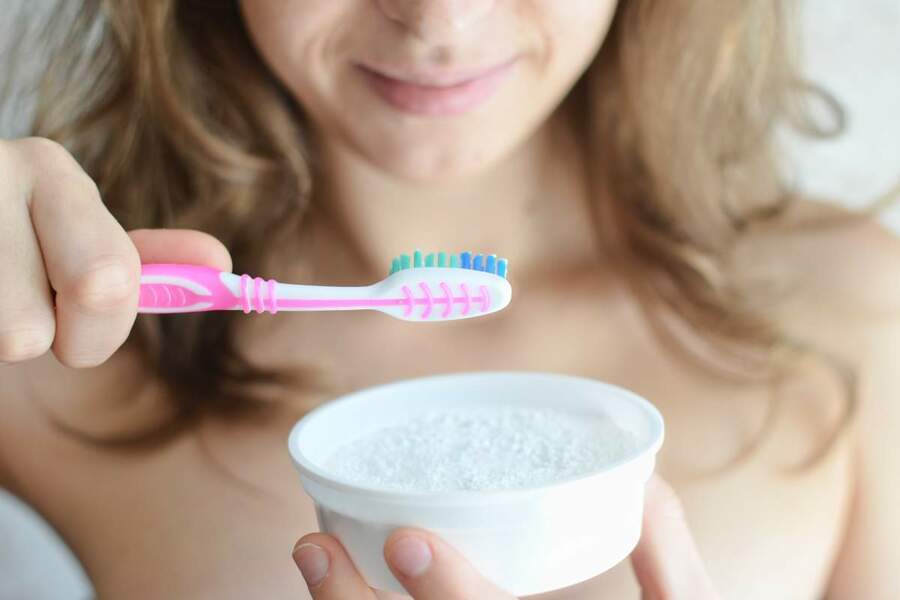If you want to whiten your teeth naturally, there are several ways to do so.
1. Baking soda
Baking soda is an effective natural teeth whitener that removes surface stains and foreign substances from the teeth. While it won’t dramatically change the natural color of your teeth, it will work as a powerful abrasive. In addition to being effective, it doesn’t contain any of the chemicals commonly found in commercial whitening toothpaste.
To naturally whiten your teeth, simply mix one teaspoon of baking soda with two teaspoons of water. You can apply the paste to your teeth for a few weeks. Another popular natural teeth whitener is hydrogen peroxide, but it can cause some side effects. You may want to check with your dentist before starting any new teeth-whitening program.
While baking soda is an effective teeth-whitening method, it does damage the enamel on your teeth. It’s best to use it once a week, for no more than two minutes, and avoid using it more than twice a week. Too much use can cause tooth sensitivity and increase the risk of cavities. However, using baking soda daily for a week or two is enough to get your teeth brighter.
Another way to naturally whiten teeth is by eating strawberries. Strawberries contain malic acid, which can help remove surface stains from your teeth. Another method involves combining strawberries and baking soda and brushing your teeth with the mixture for one to two minutes. You should rinse off with water after brushing with the paste. Repeat the procedure every two weeks for two to three months.
Using baking soda to naturally whiten teeth at home can help prevent dental cavities and brighten your smile. It is a safe natural cleaner, and mixing a teaspoon with a teaspoon of table salt is an effective way to remove surface stains.
2. Coconut oil
Coconut oil is one of the most popular ingredients for teeth whitening. It is inexpensive and can be used both on the teeth and on the gums. It also has a variety of other uses for oral care. Some people even use it for oil pulling to whiten their teeth. While it is not a substitute for a professional whitening product, it does have some advantages.
Coconut oil is also excellent at getting rid of bad breath. You can apply a small amount to your toothbrush bristles once a day to eliminate the smell. However, it is important to use a toothbrush with soft bristles. You can also use a manual water flosser, which is gentler on the teeth.
Another option for teeth whitening is to brush your teeth with melted coconut oil. You should allow the oil to sit on your tongue for five to 20 minutes and then swish it around your gums and teeth. Make sure not to gargle with the oil because it can clog up your sink. This method is very effective and is highly recommended. It will improve your oral health and whiten your teeth.
Using organic coconut oil to brush your teeth is a natural option. It is rich in lauric acid, which is an anti-inflammatory and anti-microbial substance that helps remove plaque and bacteria from the teeth. You can also try using all-natural coconut oil toothpaste if your teeth are sensitive. However, coconut oil should not be used as a substitute for proper oral hygiene. It is better to stick to your regular teeth brushing and flossing routine. This will help you avoid dental problems such as gum disease and tooth decay.
3. Hibiscus tea
Drinking hibiscus tea to whiten teeth at home is an easy way to improve the color of your smile. While the tangy drink is great for your oral health, don’t add too much sugar to get maximum results. Sugar is bad for your body. Instead, you can try adding honey or lime juice.
The tea is loaded with antioxidants, including polyphenols. These compounds help fight inflammation, protect against heart disease, and balance blood sugar levels. It also has antibacterial properties. Moreover, it can reduce periodontal pockets and gum recession. You can add manuka honey to your tea to whiten your teeth at home.
4. Charcoal
You can buy activated charcoal at a health food store or pharmacy and grind it to a fine powder. This paste can be used to brush your teeth. However, you should avoid swallowing the paste since it may damage your teeth. Charcoal should be used only as a last resort and not on an ongoing basis.
The best way to whiten teeth naturally is to practice good oral hygiene. This means brushing your teeth regularly to prevent gum disease, tooth decay, and enamel erosion. Additionally, charcoal-based products can be an effective natural teeth whitener. The negative ionic charge of activated charcoal helps lift away stains and fight cavities and bad breath. However, you should consult your dentist before starting any whitening process.
Charcoal has been used for many years as a scrub and toothpaste. In ancient Rome, the working class used it to scrub their teeth with, and it’s still widely used in some developing countries today. Today, it’s being marketed as an effective natural teeth whitener, but there are no scientific studies to support this.
Activated charcoal is produced in several different ways. Some manufacturers process the charcoal by using chemicals while others expose it to superheated steam. It is then milled into a fine powder. Charcoal can be used to brush your teeth, but make sure to check its abrasiveness before applying it to your teeth. If you want your teeth to look whiter, you should always use a fluoride-containing toothpaste after using activated charcoal.
Charcoal can be a powerful teeth whitener, but it’s important to avoid overusing it, as it can damage your enamel. It’s also important to use a soft-bristled toothbrush when using this method. Charcoal toothpaste should be left on your teeth for a few minutes, and you shouldn’t brush it too often.

